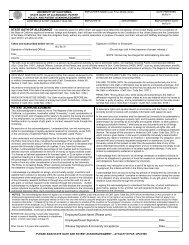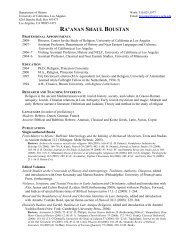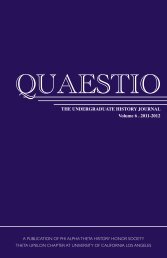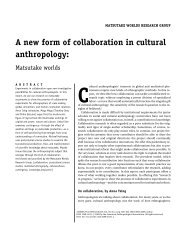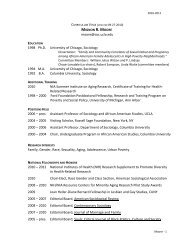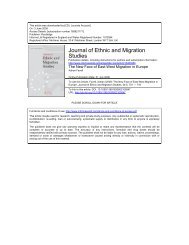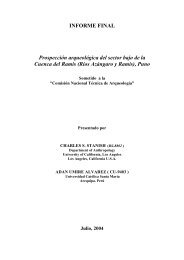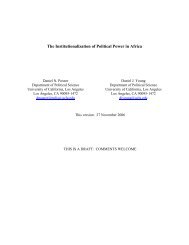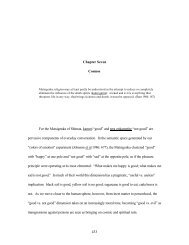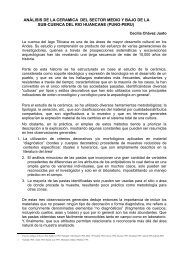The Long-Term Effects of Africa's Slave Trades - Social Sciences ...
The Long-Term Effects of Africa's Slave Trades - Social Sciences ...
The Long-Term Effects of Africa's Slave Trades - Social Sciences ...
Create successful ePaper yourself
Turn your PDF publications into a flip-book with our unique Google optimized e-Paper software.
5 Econometric Issues: Causality and Measurement<br />
Error<br />
Although the OLS estimates show that there is a relationship between slave<br />
exports and current economic performance, it remains unclear whether the<br />
slave trades have a causal impact on current income. An alternative explanation<br />
for the relationship is that societies that initially had poor domestic<br />
institutions or were frequently engaged in conflict and warfare may have<br />
selected into the slave trades. <strong>The</strong>se characteristics may persist today, adversely<br />
affecting current income. <strong>The</strong>refore, one observes a negative relationship<br />
between slave exports and current economic development even though<br />
the slave trades did not have a causal effect on subsequent development.<br />
I pursue three strategies in order to evaluate the causal effect <strong>of</strong> the slave<br />
trades. First, using historic data and qualitative evidence from African historians,<br />
I evaluate the importance and characteristics <strong>of</strong> selection into the slave<br />
trades. As I will show, the available evidence suggests that selection was important,<br />
but that it was the societies that were initially the most prosperous,<br />
not the most backward, that selected into the slave trades. <strong>The</strong>refore, the<br />
strong relationship between slave exports and current income cannot be explained<br />
by selection. Rather, selection will bias the OLS estimates towards<br />
zero. Second, I use the distance from each country to the location <strong>of</strong> the<br />
demand for slaves to identify variation in slave exports that is uncorrelated<br />
with any African characteristics. Third, I control for observable country<br />
characteristics.<br />
5.1 Historical Evidence on Selection during the <strong>Slave</strong> <strong>Trades</strong><br />
A large proportion <strong>of</strong> the early trade between Africans and Europeans was<br />
also in commodities other than slaves. During this time, only societies with<br />
institutions that were sufficiently developed were able to facilitate trade<br />
with the Europeans. Between 1472 and 1483, the Portuguese sailed south<br />
along the West coast <strong>of</strong> Africa, testing various points <strong>of</strong> entry looking for<br />
trading partners. <strong>The</strong>y were unable to find any societies north <strong>of</strong> the Zaire<br />
river that could support trade. Vansina (1990, p. 200) writes that “the<br />
local coastal societies were just too small in terms <strong>of</strong> people and territory;<br />
their economic and social institutions were too undifferentiated to facilitate<br />
foreign trade.” Sustained trade did not occur until the Portuguese found<br />
the Kongo Kingdom, located just south <strong>of</strong> the Zaire river. Because the<br />
Kongo Kingdom had a centralized government, national currency, and welldeveloped<br />
markets and trading networks, it was able to support trade with<br />
25




